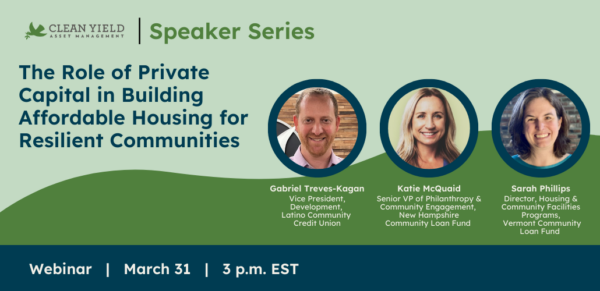Impact Profile: Cooperative Fund of the Northeast

For businesses seeking a model of cooperative, community-based ownership, conventional equity financing is often prohibitively expensive — a reality that is particularly detrimental for communities with limited personal wealth, such as Black, Indigenous, and People of Color (BIPOC) and immigrant populations, as well as rural low-income communities. The mission of Cooperative Fund of the Northeast (CFNE) is to make financing more accessible, especially for underserved communities.
Founded in 1975, CFNE is a Massachusetts-based nonprofit community development financial institution (CDFI) that promotes economic, social, and racial justice by advancing community-based, cooperative, and democratically owned or managed enterprises.
CFNE supports the cooperative ecosystem in the Northeast by providing loans and technical assistance to cooperatives and nonprofits in New England and New York. Through flexible loans tailored to the recipient’s growth and repayment capacity, CFNE is expanding access to capital in communities that can most benefit. To date, the organization reports 7,580 units of affordable housing were created or preserved and 16,342 jobs were created or retained with CFNE loans.
Advancing Democratic Ownership and Economic Justice
CFNE recognizes that businesses owned and controlled by the communities they serve are powerful tools for building wealth and access in historically marginalized communities. However, the shared ownership structure of cooperatives creates challenges in accessing capital from traditional sources. Conventional equity financing is often prohibitively expensive due to the dividend demands and the requirement to relinquish board seats, which can undermine democratic governance and financial sustainability. These challenges are even greater for communities with limited personal wealth.
By providing low-cost, flexible capital in BIPOC, immigrant, and rural low-income communities, CFNE helps to advance democratic ownership and economic justice.
CFNE offers patient, flexible, and affordable financial products tailored to the unique needs of its borrowers. But funding is just one piece of the puzzle — CFNE also provides bilingual, long-term technical support to help recipients build essential business skills. Take the Co-op Launch Loan, which is designed for cooperative founders who lack personal wealth, and offers early-stage, high-risk capital when it’s needed most. With an equity-like structure, repayments are tied to business success, ensuring a financing model that’s both supportive and sustainable. You can learn more in CNFE’s 2024 Impact Report.
Examples of the businesses CFNE has supported with its loans include:
- La Finca, a worker-owned farm and community space located in Southern Maine;
- Plainfield Co-op, a community hub and general store for the small town of Plainfield, Vermont;
- Maine Community Power Cooperative (MCPC), a consumer-owned community solar cooperative in Western Maine; and
- Samara Collective, a worker-owned communications agency that provides communications and capacity-building services to nonprofits, political campaigns, and small businesses.
A Balanced Approach to Cooperative Financing
CFNE uses a loan evaluation approach that it believes is more appropriate for its lendees by setting clear standards that both mitigate risk and expand access for those often shut out of conventional financing. Unlike commercial lenders, CFNE doesn’t rely on credit scores. Instead, it assesses the 5 C’s of credit risk — character, capacity, capital, collateral, and conditions — while also factoring in mission-driven considerations. This nontraditional underwriting process can classify some loans as lower risk that would be viewed as higher risk by traditional banking standards by using this broader framework.
Recent updates to CFNE’s lending policies and underwriting practices further mitigate risk by better anticipating potential losses. CFNE has allocated more resources to connect start-ups with grant funding and mentorship opportunities, and also provides robust technical assistance to loan recipients.
Despite serving borrowers who typically face higher barriers to financing, CFNE has maintained a loss rate of less than 2% since its inception, comparable to commercial lenders.
Plus, the shared ownership structure of cooperative businesses provides greater resilience compared to sole proprietorships, offering added durability in the face of economic pressures.
CFNE’s uses best practices developed by other standard setting organizations in its approach impact measurement, aligning with the Community Development Financial Institution Fund’s framework, along with key indicators from Aeris, IRIS+, and the UN Sustainable Development Goals.
For CFNE, measurement indicators include the success of its borrowers and the amount of capital deployed, but also go beyond financial return measures to incorporate social markers, including:
- Increase in the number of loans to borrowers who identify as Black, Asian, Indigenous, Latinx, and/or immigrant by 28% (2026).
- Over 2,000 high-quality jobs and over 400 affordable housing units created or preserved over the next three years.
- Number of hours of technical assistance provided both in English and Spanish.
CFNE provides the opportunity to invest in an organization dedicated to advancing democratic ownership and economic justice by providing low-cost, flexible capital while directly supporting the growth of the New England cooperative ecosystem through a lower-risk option with flexible terms. Now that’s co-op cooperation!
Learn more about Cooperative Fund of the Northeast.

More News & Insights
Upcoming Speaker Series: The Role of Private Capital in Building Affordable Housing for Resilient Communities
We invite you to join us on March 31 at 3 p.m. ET to participate in this critical conversation on affordable housing.
Proxy Voting: A Critical Tool for Individuals and Investors to Influence Corporate Behavior
Learn how proxy voting gives equity (stock) investors a powerful tool to pressure corporations to act more responsibly.
A New Kind of Meat
Through Clean Yield’s U.S. Sustainable Investment Forum membership, Liz Levy attended a meeting to gain insights on the emerging cultivated meat industry.


